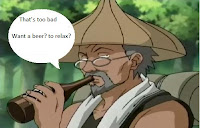I am nearly done with my second Gospel and I have to say I am really glad. Don't get me wrong, I enjoyed reading about Jesus and learning from his teachings from many perspective but, I am glad it's over because it was hard, long and in most parts boring. The Gospels really helped me understand more about religion's history but I wouldn't want to read them again (I have a feeling I'm going to).
I really love the way Jesus isolates religion and his teachings and doesn't mix them with other issues. When Caesar wanted to convict Jesus he sent out some Pharisees and Herodians to try to catch him in the act, but Jesus knew this and managed to defend himself by keeping the two matters separated from each other, "Teacher, we know you are a man of integrity. You aren't swayed by men, because you pay no attention to who they are; but you teach the way of God in accordance with the truth. Is it right to pay taxes to Caesar or not? Should we pay or shouldn't we?" But Jesus knew their hypocrisy. "Why are you trying to trap me?" he asked. "Bring me a denarius and let me look at it." They brought the coin, and he asked them, "Whose portrait is this? And whose inscription?"
"Caesar's," they replied. Then Jesus said to them, "Give to Caesar what is Caesar's and to God what is God's." And they were amazed at him." I thought it was cool how Jesus already knew what they were trying to do and answered with another question only to leave them amazed at what he was saying. Sorry Caesar you can't condemn Jesus... Yet.
Then I was bewildered when a teacher of law asked Jesus, "Of all the commandments, which is the most important?" I naturally thought that Jesus wasn't going to give him an answer, but I was wrong. Jesus actually answered him, "The most important one," answered Jesus, "is this: 'Hear, O Israel, the Lord our God, the Lord is one.[e] 30Love the Lord your God with all your heart and with all your soul and with all your mind and with all your strength.' The second is this: 'Love your neighbor as yourself.'[g]There is no commandment greater than these." The reason I found this to be so funny was because I thought and I had been taught that all commandments were equally important and that none stood before another, but evidently I was wrong. I mean how can something about your neighbor be one of the most important teachings of Jesus? I find that a bit odd.
Another thing I found a bit offsetting was that after the man answered Jesus' reply, "You are right in saying that God is one and there is no other but him. To love him with all your heart, with all your understanding and with all your strength, and to love your neighbor as yourself is more important than all burnt offerings and sacrifices." Jesus said, "You are not far from the kingdom of God." And after that no one dared to ask questions. Why is that? Did I not understand what Jesus meant by saying that he was close to the kingdom of god? Why then were people so afraid to ask questions? If you have an answer, please comment on this post.
As my title might have suggested I think these few chapters were very unfair. First of all everyone is trying to condemn Jesus and they are accusing him of crimes he didn't even commit! That to me is an outrage, but what I found most interesting was that Jesus knows he is innocent and knows they are all lying, but doesn't say a thing. Maybe he wanted to be convicted and needed to sacrifice himself in order to save us. In that case, Thank you Jesus Christ Superstar!
I have to say that my favorite part of the Gospel was when I saw that he had resurrected. I was so happy. My favorite part was this one, "But when they looked up, they saw that the stone, which was very large, had been rolled away. 5As they entered the tomb, they saw a young man dressed in a white robe sitting on the right side, and they were alarmed. "Don't be alarmed," he said. "You are looking for Jesus the Nazarene, who was crucified. He has risen! He is not here. See the place where they laid him. 7But go, tell his disciples and Peter, 'He is going ahead of you into Galilee. There you will see him, just as he told you.' " I thought it was so cool that Jesus said that he would resuscitate and he did. What shocked me the most were Jesus' last words, ""Go into all the world and preach the good news to all creation. 16Whoever believes and is baptized will be saved, but whoever does not believe will be condemned. 17And these signs will accompany those who believe: In my name they will drive out demons; they will speak in new tongues; 18they will pick up snakes with their hands; and when they drink deadly poison, it will not hurt them at all; they will place their hands on sick people, and they will get well." I think Jesus is right and although we don't always believe what he says or have doubts about his teachings that we must always have faith no matter how the situation looks.
Jesus Christ Superstar!











